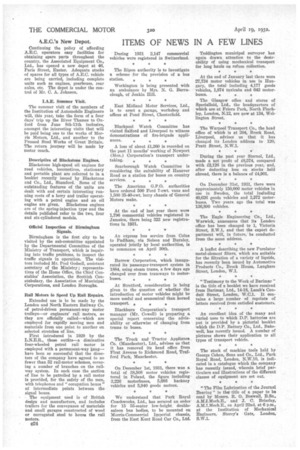A..E.C.'s New Depot.
Page 46

If you've noticed an error in this article please click here to report it so we can fix it.
Continuing the policy of affording A.E.O. operators easy facilities for obtaining spare parts throughout the country, the Associated Equipment Co., Ltd., has opened a new depot at 46, Paris Street, Exeter. Adequate stocks of spares for all types of A.E.C. vehicle are being carried, including complete units such as engines, gearboxes, rear axles, etc. The depot is under the control of Mr. C. A. Johnson.
I.A.E. Summer Visit.
The summer visit of the members of the Institution of Automobile Engineers will, this year, take the form of a four days' trip up the River Thames to Oxford from June 8th-11th inclusive, amongst the interesting visits that will be paid being one to the works of Morris Motors, Ltd., and another to the Pressed Steel Works of Great Britain. The return journey will be made by motor coach.
Descriptive of Blackstone Engines.
Blackstone high-speed oil engines for road vehicles, locomotives, stationary and portable plant are referred to in a booklet recently issued by Blackstone and Co., Ltd., Stamford. Some of the outstanding features of the units are dealt with and certain interesting running costs of a lorry and trailer operating with a petrol engine and an oil engine are given. Blackstone engines are of the spring-injection type and the details published refer to the two, four and six-cylindered models.
Official Inspection of Birmingham Signals.
Birmingham is the first city to be visited by the sub-committee appointed by the Departmental Committee of the Ministry of Transport, which is inquiring into traffic problems, to inspect the traffic signals in operation. The visitors included Mr. Pool Godsell, assistant secretary of the Ministry; representatives of the Home Office, the Chief Constables' Association, the Scottish Constabulary, the Association of Municipal Corporations, and London Boroughs.
Rail Motors to Speed Up Rea Repairs.
Extended use is to be made by the London and North Eastern Railway Co. of petrol-driven permanent-way motor trolleys—or engineers' rail motors, as they are officially called—which are employed for rapidly moving men and materials from one point to another on selected stretches of line.
First introduced in 1929 by the L.N.E.R., these outfits—a diminutive four-wheeled petrol rail motor is employed with a permanent-way gang— have been so successful that the directors of the company have agreed to no fewer than 52 rail-motor schemes, covering a number of branches on the railway system. In each case the section of line to be patrolled by a rail motor is provided, for the safety of the men, with telephones and "occupation boxes" at intermediate points between the signal boxea.
• The equipment used is of British design and manufacture, and includes trailers for the conveyance of materials and small garages constructed of wood or corrugated steel to house the rail motors.
024












































































































